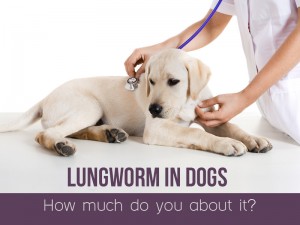
Lungworm in dogs How much do you know about it?
The number of reported cases of lungworm disease are rising in the UK and it is very important for owners to know more about the illness, in order to protect their dog from it.
Lungworm disease is caused by small roundworms, parasites called Angiostrongylus Vasorum and young dogs are more commonly affected. The adult parasites can measure up to 2.5 cm (1 inch) and they live in the dog's pulmonary blood vessels and sometimes in its heart.
These parasites have a complex life cycle. The adults will lay eggs and larvae will hatch from them. These immature worms will then enter the dog's lungs eventually being coughed up and swallowed. They will follow the dog's digestive tract and be passed out in their faeces. Once outside the dog's body they will enter a suitable slug or snail and will only develop into adult worms if the slug or snail is ingested by a dog.
Dogs that become infected with lungworm spread the parasite into the environment through their faeces, which increases the chances of other dogs becoming infected.
Although curious dogs might eat slugs and snails on purpose, dogs usually swallow them by accident when they play with toys that have been left outside, when they drink from puddles or outdoor water bowls or even when they eat grass. If your dog eats these molluscs then your pet is at a higher risk of suffering from this disease.
You can reduce the risk of your pet getting infected by being extra careful and regularly cleaning its water bowls, keeping your garden free of dog poo and by making sure your pet's toys are not left around in the garden overnight.
Lungworm infections can result in several nonspecific and sometimes intermittent clinical signs, which can be easily confused with other illnesses. Affected dogs may present signs such as reduced tolerance to exercise, depression, coughing, weight loss, lethargy, vomiting, bleeding excessively from minor wounds, present breathing difficulties and fits. If left untreated it can be fatal.
Once diagnosed and treated, dogs will usually make a full recovery but it is very important to start treatment early.
If you dog is showing any of the previously mentioned signs or if he or she is at a higher risks of becoming infected, talk to your vet!
Would you like to know more about dogs? Check our Canine Courses:
Canine courses
Read the previous article: Introducing your new cat to your resident cat or cats


